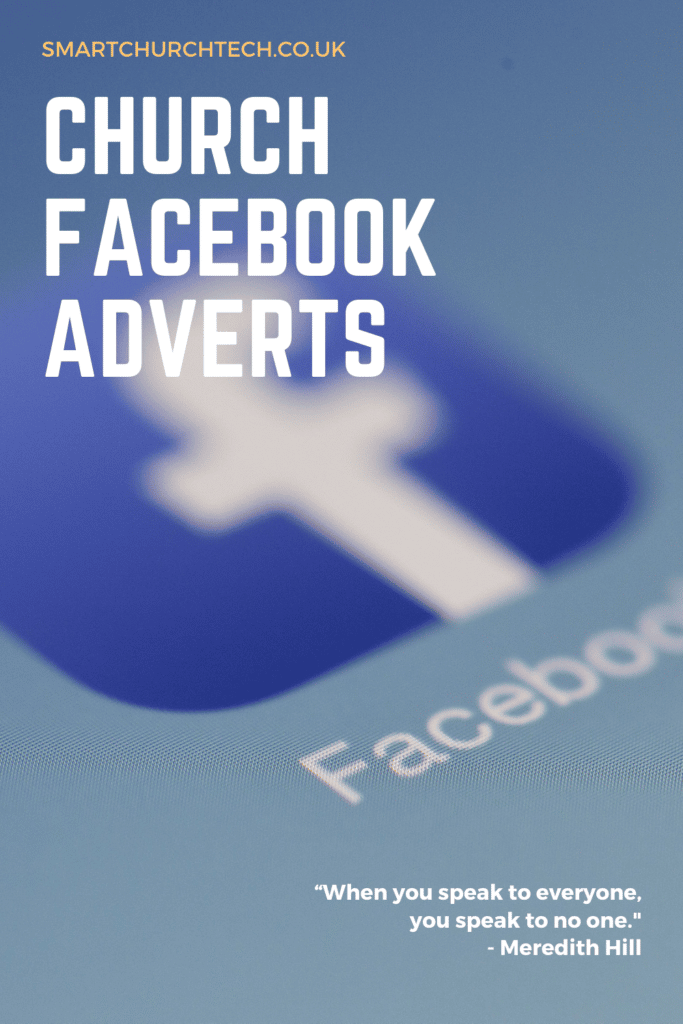The Great Commission
Then the eleven disciples went to Galilee, to the mountain where Jesus had told them to go. When they saw him, they worshiped him; but some doubted. Then Jesus came to them and said, “All authority in heaven and on earth has been given to me. Therefore go and make disciples of all nations, baptizing them in the name of the Father and of the Son and of the Holy Spirit, and teaching them to obey everything I have commanded you. And surely I am with you always, to the very end of the age.”
Matthew 28:16-20
In the quest to make disciples of all nations, there is a need to reach out to people. In times gone by, this was often done with noticeboards outside church buildings, with preachers out on the street, even with local newsletters.
Times have changed, and the rise of both the internet and COVID-19 have led to a change in tactics. If you want to reach the world, you might not be allowed with 6 feet of them, and you certainly can’t touch them.
In any form of advertising – and if you want to attract people to a church, you’re going to need to advertise, whether you want to call it that or not – you need to place your advert where someone will see it. That’s why adverts are ubiquitous on TV, as many people spend a lot of time in front of the gogglebox. The more popular the show, the higher the amount charged to feature in the ad breaks.
This reaches the extreme in America on Super Bowl Sunday, when the half-time ad break sees sub-30 second adverts selling for multi-million dollar amounts.
The chances are that you don’t have a million-dollar budget. You might not have a budget at all. But I urge you, in this modern age, in this time of online services, in this time of digital e-ministry, as church leaders you need to put some money into social media advertising.
If you’re promoting anything through print media, you’ll see a tenfold benefit in choosing to go online instead (or as well). It’s easier than going door to door, and more immediate than any other medium. You just need to be unafraid of committing to using it.
Would Jesus use Church Facebook Ads?
The historical Jesus we see in the Bible didn’t have the option to use Facebook Ads, nor was he trying to get people to come to his church building, so the answer is clearly “no” – but would the eternal Jesus agree with the idea behind it?
I think he would, as he reached people at their own level. Rather than trying to explain the mysteries of the universe and how to live a good life with charts, diagrams, and technical descriptions, Jesus told parables.
He met people where they were (for example, fishing), and told them stories that engaged them, full of concepts they could understand.
You can meet people where they are – on social media – and tell them stories through text and imagery that resonates with them. However, unlike Jesus, you won’t need to walk around the countryside (or on water) to do this!
How do Church Facebook Ads Work?
This is a two-part question. If the fundamental question is “how does advertising work?” then the answer is that it reminds people to look at, buy, or do something. Multiple reminders become lodged in the mind, with the general consensus being that it takes between 4 and 8 impressions of an advert for it to be noticed and remembered.

If you’re in the UK, you can see this by completing the phrase “That’s why mums go to…” and shouting “…Iceland!”
You’ll probably know you’re worth it if you buy L’Oreal, that Apple likes to Think Different, and KFC is finger-lickin’ good.
Why do you know this? Because it’s been told to you time and time again. Can you honestly say that your church is as well-known in your town as the need for a Kit Kat when you want to have a break?
The issue you have is a form of brand recognition (or a lack thereof). You need to be at the front of people’s minds when they think of what they should do or where they can turn in an hour of need. If you want to promote a certain event, then that event needs to be lodged in their memory as firm as it can be.
In the simplest sense, if you are running anything – even a weekly church service – people won’t join the service unless they know it is happening!
The second part of this question is around how Facebook ads work. Now, there are a million different guides for setting up adverts and how to optimize them, so it’s not worth wasting your time with information you can find elsewhere – in fact, Facebook has a brief guide on how to set up adverts at https://en-gb.facebook.com/business/ads
What you need to know is how to make it work for your church.
The Church Facebook Ads Process
Many churches are utilizing Facebook adverts to reach people of their communities and spread their message, and it seems simple to get started. In a nutshell:
- Log in to Facebook
- Set up an advertising account at https://en-gb.facebook.com/business/ads
- Create an advert
- Set a budget
- Hit the go button, and wait for the results
For some church leaders, they’re going to fall at step one. Not having a Facebook account is a major hurdle to overcome, but even if you don’t have one, you can recruit assistants. You may need a couple of trusted people to help – perhaps a social media advert coordinator is in order.
One important thing to keep in mind is that Facebook ads are designed for people to take action. You’ll need a destination to send people to, which can be your church Facebook page, a Facebook event, a website, or even your YouTube channel. If you don’t have at least one of these, it’s a good idea to set one up before starting advertising.
The first step in Facebook ad creation is to choose an objective, which is to say what you want to achieve from the advert. Options include Brand Awareness – raising the profile of your church so more people are aware of it – to traffic (to your website or page) and Engagement – getting people to interact with the advert post.
You can also promote Facebook Events that you have set up (perhaps an outreach of some kind) or boost a post from your church Facebook page so that more people see it – an ideal choice if your page only has a few followers and you want to get the word out.
You need to make the choice that is most appropriate to your needs. There is little difference in the Facebook ad interface following this (some options may or not appear), but behind the scenes, Facebook will optimize the delivery of your advert to reach the people it is most likely to resonate with.
You can partially influence this by setting up the demographics section of the ad designer. You can target geographic areas, so your ad will be shown to people who live nearby your church (or further afield if you so choose).
You can target age groups and genders, so if you have an event that is particularly appropriate for women over 40, you can only show ads to that demographic. There may be a lack of young people at your church, so why not advertise to the 20-35-year-olds in your area? The possibilities are quite wide.
You can also target people based on their interests which can be useful for certain types of events. If you want to run a course for people who want to get married, you can target people who are engaged. Use your imagination, as well-targeted advertising gets a better response than casting a wide net and hoping for the best.
The next important step is to choose text and images for your advert. Photos or graphics should be bright and impactful to attract attention – not lurid, but strong enough to stand out among the regular posts on Facebook.
The key is to gain attention. If you are trying to build awareness of your church or event, you don’t need interaction with the ad, you just need it to be remembered – however, if a viewer clicks on the “Like” button for the ad, or become a “fan” of your Facebook page, you’ll be able to use this to your advantage. Any further campaigns will reach those who liked your ad, and you can directly send them an invite to like your page.
Once someone likes your page, you’ll be able to promote different areas of your ministry to them as they will begin to see regular updates that you post. When people like what they see, they will often share the post/advert with their family and friends, leading to widespread advertising occurring naturally.
The great thing about this is you can just dip your toe in the water to see what kind of response you get – you can advertise for a single day and spend just £2 (or $2 depending on where in the world you are). It’s difficult to extrapolate long-term results from a one-day campaign, but you will see how many people you can reach quickly, and how many are interested.
When your advert is set up and you hit the publish button, Facebook will review what you’ve created. It’s normally approved within a few hours – but here’s the exciting part. The ad can start running as soon as it is approved! So if you need to advertise something happening within the next 24 hours, it is possible to generate interest quickly.
Optimizing Church Facebook Ads

Remember that you can use church Facebook ads for multiple reasons, including promoting special events, boosting inspiring videos, posts about scripture, and even blog posts. In fact, it’s very easy to do this – once your Facebook ads account is set up, you’ll just need to click the “boost” button on any post you publish, set a budget and length for the campaign, and off you go.
Using ads in this manner can increase interaction with your Facebook page, your website, etc. This can lead to an increase in people visiting your church in person or joining you for your online services, truly helping you to reach the people of the world.
Many churches will not want to do any kind of marketing or advertising, but you aren’t trying to sell anything – the purpose of this exercise is to engage with people. You can use church Facebook adverts to attract people who have recently moved to your area or even just people in your area who consider themselves to be Christians.
The way to do this effectively is to optimize the advert through careful choice of demographics. Assuming you wish to work locally, target your town or city, and the area around it. The ad creation tool will show you the potential number of people you can reach with your chosen options.
It’s usually a good idea to aim for 10k+, but this can be affected by the size of your town. Small villages simply won’t have that many people, even if you include everything in a 10-mile radius. The biggest issue is the maximum reach, believe it or not.
You may think advertising to everyone is a good idea, but…
“When you speak to everyone, you speak to no one.”
Meredith Hill
Imagine you’ve opened a restaurant that sells only steak, and you advertise to 10 million vegetarians. How many are coming along to try your food?
You are a local church, so advertising to people in Spain to visit your church in Scotland won’t necessarily work. There’s a language barrier to overcome, and if you’re expecting them to arrive in person, you may be disappointed.
The more specific your audience demographic is, the more likely you are to get a response. Choose your area, add in the surrounding towns, and where appropriate choose demographic options for age, interests, etc. If your audience is approaching 1 million people, you probably need to target more effectively.
The issue isn’t that people won’t be interested – you have to appreciate that will happen anyway – but it is the proportion of people who aren’t interested that matter. If you choose options that match your church, there’s a greater chance people will be open to it. If they have to travel a long way, your positive response rate drops. People will naturally find a reason not to do things!
Don’t waste your money on ineffective and inappropriate advertisements this year or next, target and optimize properly to facilitate engagement. You may never have run any Facebook ads before, but there are great times during the year to get started – Christmas, Easter, etc. Try a few trial runs beforehand and see what kind of response you get.
When it only costs a very small amount to get started, there are no barriers to reaching the people in your area who could become part of your church over the next few months.


